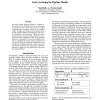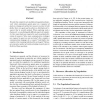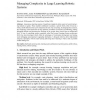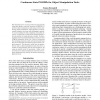1047 search results - page 4 / 210 » Learning the required number of agents for complex tasks |
AAAI
2008
13 years 10 months ago
2008
For many machine learning solutions to complex applications, there are significant performance advantages to decomposing the overall task into several simpler sequential stages, c...
ATAL
2004
Springer
14 years 1 months ago
2004
Springer
We study the complexity of a multilateral negotiation framework where autonomous agents agree on a sequence of deals to exchange sets of discrete resources in order to both furthe...
JIRS
2000
13 years 7 months ago
2000
Abstract. Autonomous learning systems of significant complexity often consist of several interacting modules or agents. These modules collaborate to produce a system which, when vi...
GECCO
2007
Springer
13 years 9 months ago
2007
Springer
In autonomous agent systems, memory is an important element to handle agent behaviors appropriately. We present the analysis of memory requirements for robotic tasks including wal...
AAAI
2007
13 years 10 months ago
2007
My research focus is on using continuous state partially observable Markov decision processes (POMDPs) to perform object manipulation tasks using a robotic arm. During object mani...




